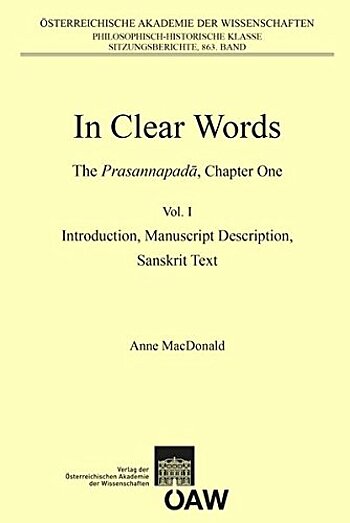
Anne MacDonald, 2015
In Clear Words: The Prasannapadā, Chapter One. (BKGA 86.) Wien: VÖAW, 2015 (download [open access] or order online). (367+584 S.)
(Vol.I: Introduction, Manuscript Description, Sanskrit Text. Vol.II: Annotated Translation, Tibetan Text.)
The Prasannapadā is one of Candrakīrti’s most important compositions. Of its twenty-seven chapters commenting on Nāgārjuna’s Mūlamadhyamakakārikā, the first, which would influence the later course of the Madhyamaka school, is the longest and most wide-ranging. It is here that Candrakīrti, in addition to elucidating Nāgārjuna’s refutation of the real existence of causes and conditions, defends his own views on critical issues of ontology and epistemology against those of prominent Buddhist scholars such as the Mādhyamika Bhāviveka and the founder of the logical-epistemological school, i. e., Dignāga, as well as non-Buddhist adversaries such as the Naiyāyikas. His detailed defense of the earlier Mūlamadhyamakakārikā commentator Buddhapālita from Bhāviveka’s critique became a topic of intense debate for Tibetan exegetes, and is often pinpointed as the source of the bifurcation of the Madhyamaka school into discrete streams and as holding the key to the controversial “Prāsaṅgika-Svātantrika distinction.”
Of utmost importance for the correct understanding of the philosophical views presented in Candrakīrti’s works are reliably edited texts of the original Sanskrit. In the century since the publication of Louis de La Vallée Poussin’s edition of the Prasannapadā, a number of old Sanskrit manuscripts of the work have been discovered, and Anne MacDonald has harvested their riches for this new edition of its first chapter. Her accompanying copiously annotated English translation makes accessible in all their complexity and brilliance Candrakīrti’s arguments against his opponents, and significantly enhances our understanding of seminal aspects of his Madhyamaka vision.